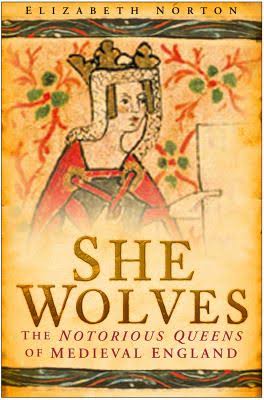Recent Reads: She-Wolves: the Notorious Queens of England was a Christmas gift, and I’m making an effort to get through my stacks of non-fiction this year (oh, god, I haven’t updated my TBR page for 2018 yet…), so I dug right in.
It’s what it sounds like: a history of England’s most notorious queens, and it reads, I’m afraid, like someone’s dissertation. There’s a great deal of “this is what I’m going to say” “here’s me saying what I’m going to say” “now that I’ve said it, let me summarize what I said” in the chapter structures. Furthermore, partly because the author is discussing the histories of women who lived as long as 1200 years ago and about whom most contemporary accounts were written by their enemies (or at least, ecclesiastical men for whom women were an often alarming mystery), and partly because dissertations are encouraged to be as speculative as humanly possible, there is rarely a paragraph that doesn’t have several instances of “may have, probably, perhaps, could have” and variations on avoiding saying anything with certainty.
That said, it also nicely weds various types of notoriety together in often rather elegant transitions, and the pedancy of the structure doesn’t take away from the interesting topic. I learned more about pre-Elizabethan English queens than I’d ever known (and also that pre-Norman-conquest they had much more interesting names: Aelfgifu and her mother Aethelgifu! Aelfthryth, daughter of Ordgar! Aethelwold, son of Athelstan Half-King! Seriously, William the Conqueror blew in & everything gets all Emma and Catherine and Elizabeth all over the place.), and lots of it is just rife for the pickings in terms of worldbuilding and politics and things. I finished it wanting to know more about many of the women (her chapter on Catherine Howard was, I think, the weakest, but Howard as a person was SO FULL OF POSSIBILITY), and regretting the fact that, indeed, most sources on them are second-hand and written by men who had reason to distrust and dislike them.
Norton’s thesis is clearly that these ‘notorious’ queens were essentially notorious because they showed ambition and sometimes political savvy, doing things that would have been perfectly acceptable had they been men but were outrageous and condemnatory because they were women, and of course she’s absolutely right. Tragically, it’s still a valid observation. :p
Anyway, it turns out she’s written a dozen other histories, mostly about the Tudor era (which has been my favourite historical era since childhood), and I’m going to have to take a look at a couple of them and see if the tone in which she writes is consistent with this one or if they’re more…fluid. I hope they are, and if they are, I’ll probably read some more of them. If not…then She-Wolves was worth reading, but I wouldn’t be convinced she’d be an author worth recommending. There are an awful lot of much more engaging historical writers. But! I have to check some more of her stuff out before deciding that for sure, and in the meantime, I think She-Wolves is a pretty good overview of some of England’s…well…most notorious queens. :)
